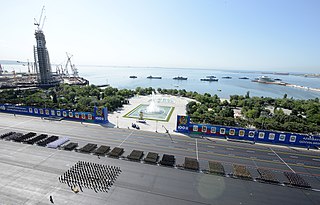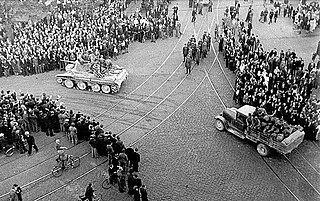
December is the twelfth and final month of the year in the Julian and Gregorian calendars and is also the last of seven months to have a length of 31 days.

May is the fifth month of the year in the Julian and Gregorian calendars and is the third of seven months to have a length of 31 days.
November is the eleventh and penultimate month of the year in the Julian and Gregorian Calendars, the last of four months to have a length of 30 days and the fifth and last of five months to have a length of fewer than 31 days. November was the ninth month of the calendar of Romulus c. 750 BC. November retained its name when January and February were added to the Roman calendar. November is a month of late spring in the Southern Hemisphere and late autumn in the Northern Hemisphere. Therefore, November in the Southern Hemisphere is the seasonal equivalent of May in the Northern Hemisphere and vice versa. In Ancient Rome, Ludi Plebeii was held from November 4–17, Epulum Jovis was held on November 13 and Brumalia celebrations began on November 24. These dates do not correspond to the modern Gregorian calendar.

Remembrance Day is a memorial day observed in Commonwealth member states since the end of the First World War in 1919 to honour armed forces members who have died in the line of duty. The day is also marked by war remembrances in several other non-Commonwealth countries. In most countries, Remembrance Day is observed on 11 November to recall the end of First World War hostilities. Hostilities formally ended "at the 11th hour of the 11th day of the 11th month" of 1918, in accordance with the armistice signed by representatives of Germany and the Entente between 5:12 and 5:20 that morning. The First World War officially ended with the signing of the Treaty of Versailles on 28 June 1919.

Armistice Day, later known as Remembrance Day in the Commonwealth and Veterans Day in the United States, is commemorated every year on 11 November to mark the armistice signed between the Allies of World War I and Germany at Compiègne, France, at 5:45 am for the cessation of hostilities on the Western Front of World War I, which took effect at eleven in the morning—the "eleventh hour of the eleventh day of the eleventh month" of 1918. But, according to Thomas R. Gowenlock, an intelligence officer with the U.S. First Division, shelling from both sides continued for the rest of the day, ending only at nightfall. The armistice initially expired after a period of 36 days and had to be extended several times. A formal peace agreement was reached only when the Treaty of Versailles was signed the following year.
By law, "the Sundays and the public holidays remain protected as days of rest from work and of spiritual elevation". Thus all Sundays are, in a manner, public holidays – but usually not understood by the term "holiday".

Victory in Europe Day is the day celebrating the formal acceptance by the Allies of World War II of Germany's unconditional surrender of its armed forces on Tuesday, 8 May 1945; it marked the official end of World War II in Europe in the Eastern Front, with the last known shots fired on 11 May. Russia and some former Soviet countries celebrate on 9 May, as Germany's unconditional surrender entered into force at 23:01 on 8 May Central European Time; this corresponded with 00:01 on 9 May in Moscow Time.

Victory Day is a holiday that commemorates the Soviet victory over Nazi Germany in 1945. It was first inaugurated in the 15 republics of the Soviet Union following the signing of the German Instrument of Surrender late in the evening on 8 May 1945. The Soviet government announced the victory early on 9 May after the signing ceremony in Berlin. Although the official inauguration occurred in 1945, the holiday became a non-labor day only in 1965, and only in certain Soviet republics.
Remembrance Days in Slovakia are working days.
National holidays in Slovakia
Public holidays in Croatia are regulated by the Holidays, Memorial Days and Non-Working Days Act.
Holidays in Poland are regulated by the Non-working Days Act of 18 January 1951. The Act, as amended in 2010, currently defines thirteen public holidays.

Many nations around the world observe some kind of Armed Forces Day to honor their military forces. This day is not to be confused with Veterans Day or Memorial Day.

Public holidays in Canada, known as statutory holidays, stat holidays, or simply stats, consist of a variety of cultural, nationalistic, and religious holidays that are legislated in Canada at the federal or provincial and territorial levels. While many of these holidays are honoured and acknowledged nationwide, provincial and territorial legislation varies in regard to which are officially recognized.
A Holocaust memorial day or Holocaust remembrance day is an annual observance to commemorate the victims of the Holocaust, the genocide of six million Jews and of millions of other Holocaust victims by Nazi Germany and its collaborators. Many countries, primarily in Europe, have designated national dates of commemoration. In 2005, the United Nations instituted an international observance, International Holocaust Remembrance Day.

Remembrance Day of the Latvian Legionnaires, often known simply as the Legionnaire Day or March 16 in Latvia, is a day when soldiers of the Latvian Legion, part of the Waffen-SS, are commemorated by Latvian nationalists. From 1998 until 2000, it was officially recognized as a "Remembrance Day for Latvian soldiers" by the Saeima.

Lāčplēsis Day is a memorial day for soldiers who fought for the independence of Latvia. It is celebrated on November 11th, marking the decisive victory by the Latvian Army over the West Russian Volunteer Army – a joint Russian-German volunteer force led by the warlord Pavel Bermondt-Avalov – at the 1919 Battle of Riga during the Latvian War of Independence, thus safeguarding the independence of the nascent nation. It initially was a day of honoring the 743 soldiers that fell in the battles around the Riga area.
Lists of holidays by various categorizations.
The following are public holidays in Ukraine.

Occupation of the Latvian Republic Day is an official day of remembrance in Latvia and is observed on June 17. It commemorates the Soviet occupation of Latvia in 1940.










